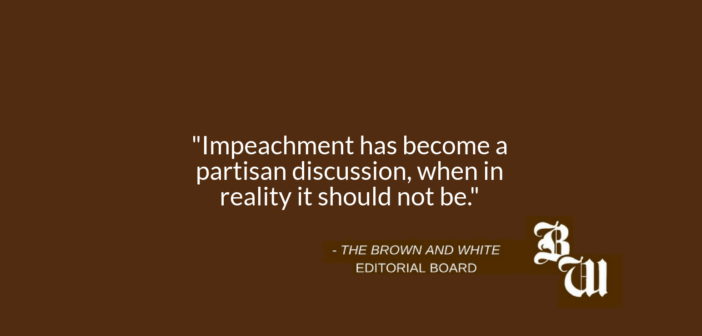Article II, Section 4 of the United States Constitution goes as follows: “The President, Vice President and all civil officers of the United States, shall be removed from office on impeachment for, and conviction of, treason, bribery, or other high crimes and misdemeanors.”
Historically, the process of impeachment has been strictly reserved for presidents who have been convicted of “high crimes and misdemeanors” while in office, such as presidents Andrew Johnson and Bill Clinton.
The process is not, however, reserved for presidents with polarizing approval rates, which is how it is currently perceived by the American people.
We have reached a standpoint in American politics in which the discussion surrounding something as drastic as the impeachment process has become a seemingly viable solution to distaste for our president.
Impeachment has become a partisan discussion, when in reality it should not be.
If we were to impeach every president who failed to please the American people, not one person who took office would be able to finish his term, as no approval rate has ever been, or most likely ever be, 100 percent.
Through the lens of President Donald Trump, despite the multitude of people who find his approach to the presidency impeachable in itself, impeachment is only a plausible solution if he can be proven of overt legal violations.
Discussions surrounding Trump carry to Lehigh as well, as over the past two years, feverish debate has surfaced on whether the university should uphold the honorary degree granted to him in 1988.
Despite the petition to revoke his degree, which received over 20,000 signatures, and the university faculty who chose to vote resulted in 83 percent of faculty supporting the revocation, Lehigh decided to take “no action” on the process.
Failure to revoke Trump’s degree raises the important discussion that conversations like these are devalued when they are approached from a partisan standpoint.
Despite the widespread distaste for Trump within our faculty, the way the university approached the revocation is similar to how the process of impeachment is intended to be.
The issue of impeaching a president is intended to benefit the country as a whole, not to appease a political party. Just as revoking Trump’s degree would appease the population of Lehigh community members who oppose him, it would also fail to meet the legitimate guidelines for revocation.
A New York Times op-ed stated that “impeachment could invite a wrenching partisan fight; render the party vulnerable to the charge that it’s obsessed with scoring points against Mr. Trump; and distract Democrats from focusing on legislation of more interest to voters.”
The argument can also be viewed from a contrasting standpoint, that opposers to Trump’s impeachment should not discount the idea of impeachment altogether, just because of their partisan ties, but to separately consider whether his actions are potentially illegal, and therefore grounds to impede on the expectations for a U.S. president.
This is a crucial standpoint to view the impeachment process, as it is essential to recognize that the process is not in place to serve as a win of one political party against another, but instead should be a united mission among the American people to ensure that our president upholds the United States’ own “principles for an equitable community.”






Comment policy
Comments posted to The Brown and White website are reviewed by a moderator before being approved. Incendiary speech or harassing language, including comments targeted at individuals, may be deemed unacceptable and not published. Spam and other soliciting will also be declined.
The Brown and White also reserves the right to not publish entirely anonymous comments.
4 Comments
The first well thought out editorial I’ve read in the new Brown and White!
“Historically, the process of impeachment has been strictly reserved for presidents who have been convicted of “high crimes and misdemeanors” while in office, such as presidents Andrew Johnson and Bill Clinton.” President Clinton was not convicted of a crime. He was impeached but not successfully removed from office. The same applies to President Johnson whose eleventh article of impeachment reads “Bringing disgrace and ridicule to the presidency by his aforementioned words and actions.” Also interesting is that the main “crime” of Johnson was breaking existing law by firing the Secretary of War. In reality these two impeachments were politically motivated.
The composition of the Senate probably guarantees that President Trump will not be successfully impeached; replaced in 2020 possibly but impeached no.
Probably not replaced in 2020. What independents are voting for the intersectional left? Unless they run Biden or Bernie, it’ll be a field day assuming the GOP doesn’t shoot themselves in the foot with a surprise Bush nomination. All the right needs to do is keep up the good numbers and point to 4 years of success vs the previous 8 years of mediocrity. I think most independents would be more interested in continuing the success of Trump (even though they might hate him), than they would be to take a gamble on a socialist candidate or a candidate that runs based on intersectionality.
So, eds, you’re saying that Congress should behave like a hedge-fund-heavy board of trustees afraid of retribution? (How about let’s take a look at *their* taxes.) Okay, then.
Yes, you’re right that impeachment should be nonpartisan when you’re talking about enemy interference in elections, including systems and infrastructure hacking, but it doesn’t look like that’s how it’ll be. Meanwhile, we’ll see how the Watergate approach goes.
As for 2020…well, 2018 was a landslide for Dems, seating a far more diverse crowd than we’ve seen before, demographically and ideologically. And today a radically unexpected result in council elections across the UK, with Tories down 1300 seats, Labour bruised, and Liberal Democrats, of all parties, the big winners. Brexit and xenophobia apparently not a winner atm. My lefty German friend who’s recently a British citizen came middle of the pack in the council elections in her Leave district, first time out in politics.
So I don’t know. The younger electorate here is far less racist and misogynist than the Boomers are, and the oldest Gen Z kids will be voting this time out. They’re very anxious to get registered, they’re pissed, and they’ll vote for whoever isn’t Trump just to stop the bleeding. I can see a lot of independents going for Kamala. There’s surprising support for Warren. I think Mayor Pete’s 15 minutes are almost up. But every Dem/lefty I’ve talked to, regardless of where they fall and who they support, is ready to live with four years of Joe if that’s what it takes. I don’t think the unity stunt was actually necessary.
A thing that’s not being discussed much is changes in social media behavior since 2016. Facebook’s seen massive fall-off; a lot of people have just walked away from living and socializing online, sharing habits have changed, and the result’s been a concentration of sewage — but the remaining audience is probably less likely than others to vote. There’s far greater awareness now of troll tactics, so even on twitter they’re shut down mid-thread with a scrum. They don’t have a way in to the young-millennial/GenZ media, which requires follower-by-follower approval by people who don’t care if they have massive numbers of followers; they care about whether they know these people. So in a funny way the external trolls are being forced to advertised in this old-fashioned political-advertising way, just getting folded into the old machine.